

Phil Booth sur Twitter : "For context you should really watch & appreciate what @CasparBowden has been saying for years: about #FISA #PRISM etc" Google Translate. Jamil Dakwar sur Twitter : "Breaking: Human Rights Council adopts resolution establishing a Special Rapporteur on the right to #privacy. #HRC28. BMW says ‘no thanks’ to tech companies asking for its connected car data. BMW refuses to yield to tech and advertising firms that are eyeing up the carmaker's connected car data, it revealed during the Detroit Motor Show.
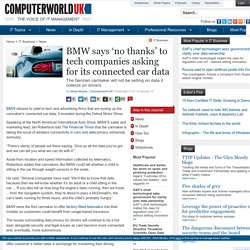
Speaking at the North American International Auto Show, BMW’S sales and marketing lead, Ian Robertson told The Financial Times that the carmaker is taking the issue of wireless connectivity in cars and data privacy extremely seriously. “There’s plenty of people out there saying: ‘Give us all the data you’ve got and we can tell you what we can do with it’”. Aside from location and speed information collected by telematics, Robertson added that carmakers like BMW could tell whether a child is sitting in the car through weight sensors in the seats. General election 2015: Youth vote 'could be key to win' 28 December 2014Last updated at 20:26 ET Up to three million young people have not decided how to vote in next year's general election, a think tank says.

About 44% of 18 to 25-year-olds have yet to decide which party to back on 7 May, research by Populus, for left-leaning think tank Demos, suggested. Demos said the party that could tap into this pool of young voters "may just win the keys to Downing Street". The survey of more than 1,000 18 to 25-year-olds also found parties needed to use social media more effectively. Demos said Skype or FaceTime MP surgeries, hustings via Facebook and online voting could all boost youth political participation. 'Jargon-free' message The research found more than three quarters (77%) intended to vote - but only 30% of young women said they were interested compared with 48% of their male peers. Asked to name the issues they were most concerned about, 69% included the cost of living, 62% affordable housing, 58% unemployment and the same proportion said the NHS. Mozilla SPURNS Google's cash, inks FIVE YEAR PLAN with Yahoo!
Simplify SSL certificate management across the enterprise Mozilla has ended its decade-long pact with Google and will now make Yahoo!
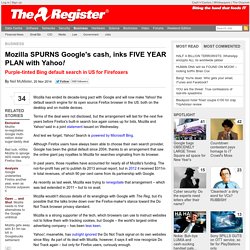
The default search engine for its open source Firefox browser in the US: both on the desktop and on mobile devices. Terms of the deal were not disclosed, but the arrangement will last for the next five years before Firefox's built-in search box again comes up for bids, Mozilla and Yahoo! Said in a joint statement issued on Wednesday. And lest we forget, Yahoo! Although Firefox users have always been able to choose their own search provider, Google has been the global default since 2004, thanks to an arrangement that saw the online giant pay royalties to Mozilla for searches originating from its browser.
In past years, those royalties have accounted for nearly all of Mozilla's funding. Patients need 'control panel' for data. CanUseeTheLight5 hours ago Apples and Oranges people.

No2id sur Twitter : "Why would anyone use an alias? #Privacy... Charter. Call for 'privacy charter' to protect personal data online - 23 May 2014. Privacy aware, non-tracking, Decentralized Advertisement engine for Android. An Open Letter to Privacy Professionals: We Need to Earn the Public’s Trust. The recent news about the extent to which the U.S. government is monitoring the communications, online interactions and activities of American citizens brings into question our ethical responsibilities as privacy professionals.
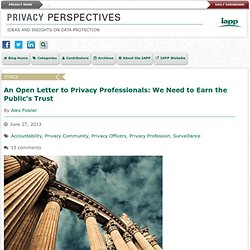
All of the companies caught up in the news that complied with secret court orders to hand over bulk user data have privacy officers and dedicated teams of privacy professionals. Yet the extent to which any of these privacy teams were involved or were aware of these orders is unclear. This simple irony provokes reflection on the role of privacy professionals and our associated ethical and social responsibilities.
The role of the privacy professional has evolved over the past decade in response to the many ways personal information and data shape all dimensions of public, business and social interactions. We’re specialized advocates for our organization’s data subjects—users, consumers, employees, citizens. You’d Need 76 Work Days to Read All Your Privacy Policies Each Year. The problem with privacy on the Internet isn’t so much that companies don’t provide privacy options or tell you that they might share your data, it’s that protecting your privacy often entails wandering the wilds of Facebook’s confusing privacy settings or reading an epic privacy agreement written in a confounding mixture of tech speak and legalese.
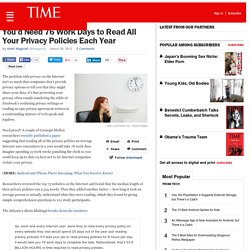
Need proof? A couple of Carnegie Mellon researchers recently published a paper suggesting that reading all of the privacy policies an average Internet user encounters in a year would take 76 work days. » VRM growing in the garden of privacy concerns ProjectVRM. With Swedes: Closet VRM activists?
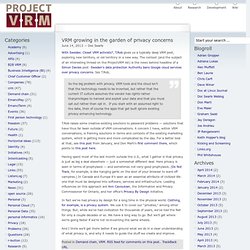
, T.Rob gives us a typically deep VRM post, exploring new territory, or old territory in a new way. The context (and the subject of an interesting thread on the ProjectVRM list) is the news behind headline of a Simon Davies post: Sweden’s data protection Authority bans Google cloud services over privacy concerns. Sez T.Rob, So the big problem with privacy, VRM tools and the cloud isn’t that the technology needs to be invented, but rather that the current IT culture assumes the vendor has rights rather thanprivileges to harvest and exploit your data and that you must opt out rather than opt in. Capitalising on tragedy. Yesterday's events in Woolwich were appalling, but Lord Carlile and John Reid wasted no time in attempting to use this atrocity in justifying a return to reductions in personal privacy and other human rights.
Snooper's charter faces rocky road. We’re only a few weeks away from the Queen’s Speech, yet there’s one significant piece of legislation from this session which has yet to be resolved.

It has already caused one big row, and will certainly cause another one when it is published. The Snooper’s Charter, better known to the ministers as the Communications Data Bill, was supposed to be published before this session ended, but it’s looking like the government is going to have to re-announce it in the Queen’s Speech instead. Theresa May told the Joint Committee on the Draft Communications Data Bill in October 2012 that ‘I am expecting it to come in to this session’, and those involved in the discussions on both the political and lobbying side about the re-draft also still expect to get a proposal from the Home Office before prorogation.
Big brother to log your drinking habits and waist size. Data includes weight, cholesterol, BMI, family health history and pulse rateDoctors will be forced to reveal alcohol consumption and smoking status Privacy campaigners described it as 'biggest data grab in NHS history'Part of new Health Service programme called Everyone CountsOfficials insisted data will be anonymous and deleted after analysis By Jack Doyle Published: 22:28 GMT, 1 February 2013 | Updated: 08:54 GMT, 2 February 2013.
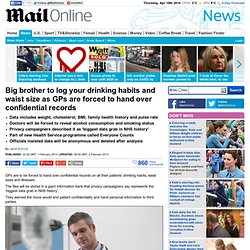
Lord Neuberger at the UK Association of Jewish Lawyers and Jurists' Lecture - The Supreme Court. Short documentary: Why Privacy Matters. Privacy International's 16-minute mini-documentary from DEFCON about privacy is a great, compact answer to the question, "Why does privacy matter?
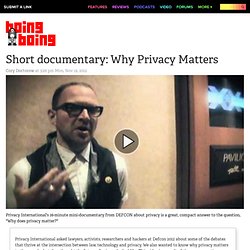
" Privacy International asked lawyers, activists, researchers and hackers at Defcon 2012 about some of the debates that thrive at the intersection between law, technology and privacy. We also wanted to know why privacy matters to them, and what they thought the future of privacy looked like. This video is a result of those conversations.
Featuring Cory Doctorow, Kade Crockford, Jameel Jaffer, Dan Kaminsky, Chris Soghoian, Marcia Hoffman, Moxie Marlinspike, Phil Zimmerman, Hanni Fakhoury and Eli O. Being social with privacy in mind. People really enjoy social features that help them connect with others. To offer these features, social networks often end collecting lots of personal info, and their users don’t always understand the tradeoffs involved. We want to offer social features in Firefox, but user privacy is fundamental to Mozilla’s DNA: it’s not something we can sacrifice. Given that, we’ve set out to find a way to combine these two aspects and enable an experience that folks can enjoy, safely. With our latest beta, we’ve started testing a new social API right inside Firefox.
Verizon Very Excited That It Can Track Everything Phone Users Do And Sell That To Whoever Is Interested. Filmmakers Use Drones to Spy on Facebook, Google HQs. Census objector granted leave to challenge Census Act. The government's prosecution of census objectors is in jeopardy after a Birmingham man was granted a judicial review to challenge the legality of the act that makes it an offence not to complete the 10-yearly survey. Privacy campaigner Nigel Simons, who did not fill out the census, argues that section 8 of the 1920 Census Act conflicts with his right to privacy guaranteed by the European Convention on Human Rights.
The granting of a judicial review comes days after two census objectors saw their prosecutions unexpectedly dropped by the Crown Prosecution Service. One of them, John Marjoram, who is mayor of the Cotswolds town of Stroud, said he thought the CPS had dropped his case rather than face the prospect of having the issues around privacy aired in a public trial.
Technology. Identity. Data_surveillance. Facebook. Digital_detriment. Freedom. Data_lockers. Burton Group Identity Blog: Gartner Gets Privacy Dead Wrong. Blogger: Bob Blakley Andrea DiMaio of Gartner recently posted a blog entry entitled "Forget Privacy: It Is Just An Illusion". DiMaio's lament rephrases Scott McNealy's famous quote ( "You have zero privacy anyway. Get over it. " ) McNealy was wrong then and DiMaio is wrong now; they're both dead wrong, and it's important.